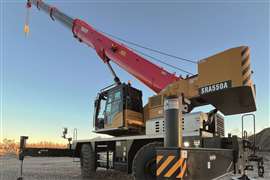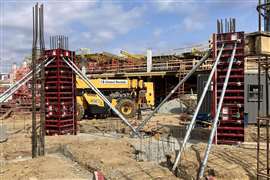Rising challenges: A reminder of the issues raised at this year's IPAF Summit
12 July 2011

JLG's Wayne Lawson was elected as the new president of IPAF, succeeding Steve Shaughnessy, who decided to step down after one year of his two year presidential term.
Mr Lawson, who was deputy president, was elected at IPAF's AGM (annual general meeting) held in Amsterdam on 14 April. The AGM took place before the IPAF Summit conference and IAPA awards dinner at the Grand Krasnapolsky Hotel in the city.
Mr Lawson, who is also a vice president at JLG, paid tribute to Mr Shaughnessy, "Steve has brought some unique skills to IPAF, including strategic thinking. The industry cannot afford to lose people like him...thanks for doing a great job, and I think it is a shame it couldn't have been for the complete two-year term."
Mr Lawson said IPAF had several major opportunities in the years ahead, including continued growth of its global footprint into developing countries. He said this presented particular challenges with regard to the different levels of training required in different markets; "We will have to look at new levels of training - I don't have the solutions, but there is going to be a good discussion and debate about it."
He added that he would also focus on ways for IPAF to communicate its messages worldwide. "You can never do it well enough - I'll be working with Tim Whiteman, the IPAF council and members to increase the levels of communication that we already have today."
Tim Whiteman, giving the managing director's report, said that PAL (powered access license) card numbers issued in 2010 had recovered to record levels after falling in 2009, with 85605 cards issued in the year. The number issued in the UK was still below the peak in 2008, but grew by 31% outside the UK.
The Summit
Leading off the speakers Gérard Déprez, chief executive officer of Loxam - Europe's largest equipment rental company - urged aerial platform manufacturers not to overlook the requirements of the European rental sector as they chase emerging markets in Asia and Latin America.
Mr Déprez, said aerial platforms represented a very important product for rental companies, but that "As a rental industry, we are anxious that manufacturers may not be able to deliver...in our region.
"The priority for manufacturers seems to be given to emerging countries where they want to increase their market shares."
Aerial platform manufacturers are trying to increase production rapidly to meet growing demand from Latin America, Australia and other Asian markets. Lead times from products are anticipated to increase.
Mr Déprez said he was "anticipating a growth phase in Europe" when the demand for aerials will return.
In response to Mr Déprez' presentation, IPAF president, Wayne Lawson, JLG's vice president and managing director for Europe, Africa and the Middle East, reminded the conference that manufacturers were having to cope with an upturn in demand after a period when sales fell by as much as 70% from the peak levels in 2007.
He said it would be a real challenge for suppliers to meet the rising levels of demand but assured the audience that JLG was aware of the needs of the European market; "Europe, in the short term, offers the greatest potential for growth...within a couple of years we will see Europe bounce back really strongly. We just need to do a lot of planning, us and rental companies."
Mr Déprez also called on rental companies to do a better job of anticipating the cycles of growth and recession in the industry. He said the rental sector, and the aerial platform market in particular, experienced exaggerated cycles, and that analysis of previous cycles gave rental companies a way of anticipating when demand was likely to fall.
"Our industry would definitely benefit from better anticipation of market cycles", he told delegates.
PowerUp
Steve Shaughnessy, the most recent past-president of IPAF and a former president of Skyjack, took to the platform and proposed a £0.75-0.9 million promotional campaign to increase the use of aerial platforms in the UK. He said a campaign was necessary to further promote the use of aerial platforms in markets that do not currently use them.
Mr Shaughnessy said that a three year trial project in the UK would require funding of between £250000 and £300000 a year but could potentially increase access rental revenues in the country by £10-14 million.
"There is still potential to grow in existing markets... and in sectors that currently underuse access", said Mr Shaughnessy. He told delegates to the IPAF Summit that his proposal drew on the initiatives made in previous years by Gordon Leicester, founder and managing director of Facelift Access Hire, and David Shipman, chairman of AFI-Uplift.
Europe's aerial platform sector, although mature in global terms, remains much smaller than that of the US. There is one platform per 720 people in the US compared to one per 1587 in the main European markets.
"Aerial platform penetration is only half that in the 11 most developed European access markets compared to the US", he said, adding that Western Europe may only have reached 35-40% of its full potential.
Mr Shaughnessy said the campaign would have a distinct identity separate from IPAF's existing work, and could comprise a combination of targeting marketing at new industries as well as the development of a website.
A provisional campaign has been drawn up under the PowerUp brand and with the slogan; "PowerUp to a new height and reach advantage." He said manufacturers, rental companies and IPAF could be approached to raise the required funds.
"The powered access story needs to be out there, and together, IPAF members could make it happen", said Mr Shaughnessy.
Tim Whiteman, IPAF's managing director, speaking immediately after the presentation, said IPAF would consult its members on the idea.
Safety at ground level
The aerial platform industry needs to take a more professional approach to the selection, design and use of outrigger pads, said Chris Wraith, then the QSHE manager (Quality, Health, Safety and Environment) at Lavendon Access Services but subsequently appointed as IPAF's new technical officer.
In a detailed presentation Mr Wraith demonstrated the importance of correctly specifying outrigger pads - and the potentially fatal consequences of not doing so - Mr Wraith said the industry as a whole and IPAF needed to work together to provide the information necessary to make it easier for rental companies and their customers to make the correct choices.
He said manufacturers should standardise on the units they use in specifying outrigger loads (he cited seven different units that are used in manuals); that information on ground bearing pressures on different soil types should be made widely available; and that materials allowing users to calculate the appropriate outrigger size for given conditions should also be produced.
"I strongly believe that there is a need to have an industry wide campaign", said Mr Wraith. He said an initiative similar to IPAF's international Clunk Click campaign for harnesses was required.
Mr Wraith has been working with an IPAF committee to provide guidance on the issue, and the committee is developing a website to provide some of the required technical information. The committee has also come up with the following draft statement on the use of outrigger plates; "Spreader plates should always be used with boom type MEWPs where they are fully supported on their outriggers."
The design of spreader plates is also an issue. "You probably don't think about it when you supply platforms", said Mr Wraith; "but believe me, you would when a machine goes over with one of your spreader plates."
Market Forces
As is becoming traditional the results of IPAFs Powered Access Rental Reports was presented by the research company Ducker. There are two reports one covering the market in Europe and the other the market in the USA. You can read more about the results in future issues of Access International.
The final presentation came from Andrew Fishburn of who urged access companies to properly motivate their sales teams, "The industry is infected with a virus," he said, "of mediocre selling."
Mr Fishburn pointed out that while businesses might be planning their strategies for years ahead: poor people skills within an organisation can sabotage this. It is important to recognise that individuals are motivated by different things and that knowledge, skills and expertise are more valuable than equipment - although it is important to recognise that appropriate tools to do the job are important.
The IPAF Summit was one of the best attended, helped by simultaneous translation available into Italian, Spanish and German as well as the engaging programme. Next year's IPAF AGM, Summit and IAPAs will take place in Rome, Italy, on 29 March.






